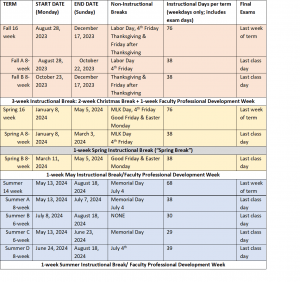
In an effort to provide more course options and scheduling flexibility for students, Concordia University has adopted a new academic calendar that standardizes breaks and course durations across all instructional levels.
The calendar is slated to go into full effect for the 2023-24 academic year, but Concordia has already begun to transition some courses to the new model. Starting in 2023-24, nearly all courses – at the undergraduate and graduate levels, and in all delivery methods (in-person, virtual, and online) – will be offered in 8- or 16- week increments. Starting in January 2024, the Winterim term, which has traditionally occurred the three weeks prior to the start of the spring semester, will be abandoned in favor of an earlier start and end to the spring semester. In 2024, for example, the spring semester will begin Jan. 8 and end May 5.
Winterim adjustment
The three weeks that have historically been assigned to Winterim will now be re-allocated to the summer term, allowing for more robust course options, explains Interim Provost Leah Dvorak, PhD.
“Our Winterim enrollment has been dwindling for years,” says Dvorak. “Faculty have expressed concerns that many courses cannot reasonably be offered in a 3-week format. Partly because of the compressed timeframe, there have been relatively few courses offered during this term. We’d rather re-allocate those weeks to the summer term and allow professors to offer courses that students want and need during the summer.”
The reimagined academic calendar also provides consistency among the terms. Traditionally, the fall term for undergraduate students was longer than the spring, which made course design a challenge. Now, the fall and spring terms will both be 16 weeks long, while summer will be 14 weeks in length. Fall and spring will each contain 2, 8 week terms, while summer will allow for academic programs to offer courses in either 8- or 6 week long formats. There will be one-week instructional breaks in between each term (fall, spring and summer) to allow faculty and staff flex time to log grades, follow up on projects, and attend to other end-of-term activities.
Academic breaks
The new calendar retains a spring break for all students. In 2024, spring break will occur March 4 through March 8.
Additionally, two “Fourth Friday” breaks have been adopted under the new model. The Fourth Fridays will take the place of Concordia’s traditional Fall Break. Previously, only traditional undergraduate students had a 2-day Fall Break in October. Under the new model, all students will have one instructional day off on the fourth Friday of the fall and spring semesters to allow all students and faculty members a day to reprieve and catch up.
The remaining holidays that have traditionally been observed, such as Labor Day, Good Friday and Easter Monday, and the two-day Thanksgiving break, will continue to be honored with the new calendar.
Consistency begets better service
Ultimately, the driving force behind this change is to better serve students, says Dvorak. Continuity across terms opens up opportunities for undergraduates who may be dipping their toes into graduate-level coursework. It also allows online course offerings to be more readily available to all levels of learners.
The Provost’s Office gathered significant input from academic deans, departments chairs, and other faculty representatives, as well as from students using survey data gathered by the Office of Institutional Effectiveness.
“We really wanted this plan to serve students and make smart use of our resources,” Dvorak says. “The feedback we’ve received thus far has been supportive of this approach and we’re diligently working to implement changes to work towards a fully integrated transition.”
Learn more
Students who have specific questions about the new academic calendar should consult their academic advisor. Faculty and staff may discuss changes with their academic dean or consult the Provost’s Office.
2023-2024 Academic Calendar

— This story is written by Kali Thiel, director of university communications for Concordia University Ann Arbor and Wisconsin. She may be reached at kali.thiel@cuw.edu or 262-243-2149.
If this story has inspired you, why not explore how you can help further Concordia's mission through giving.